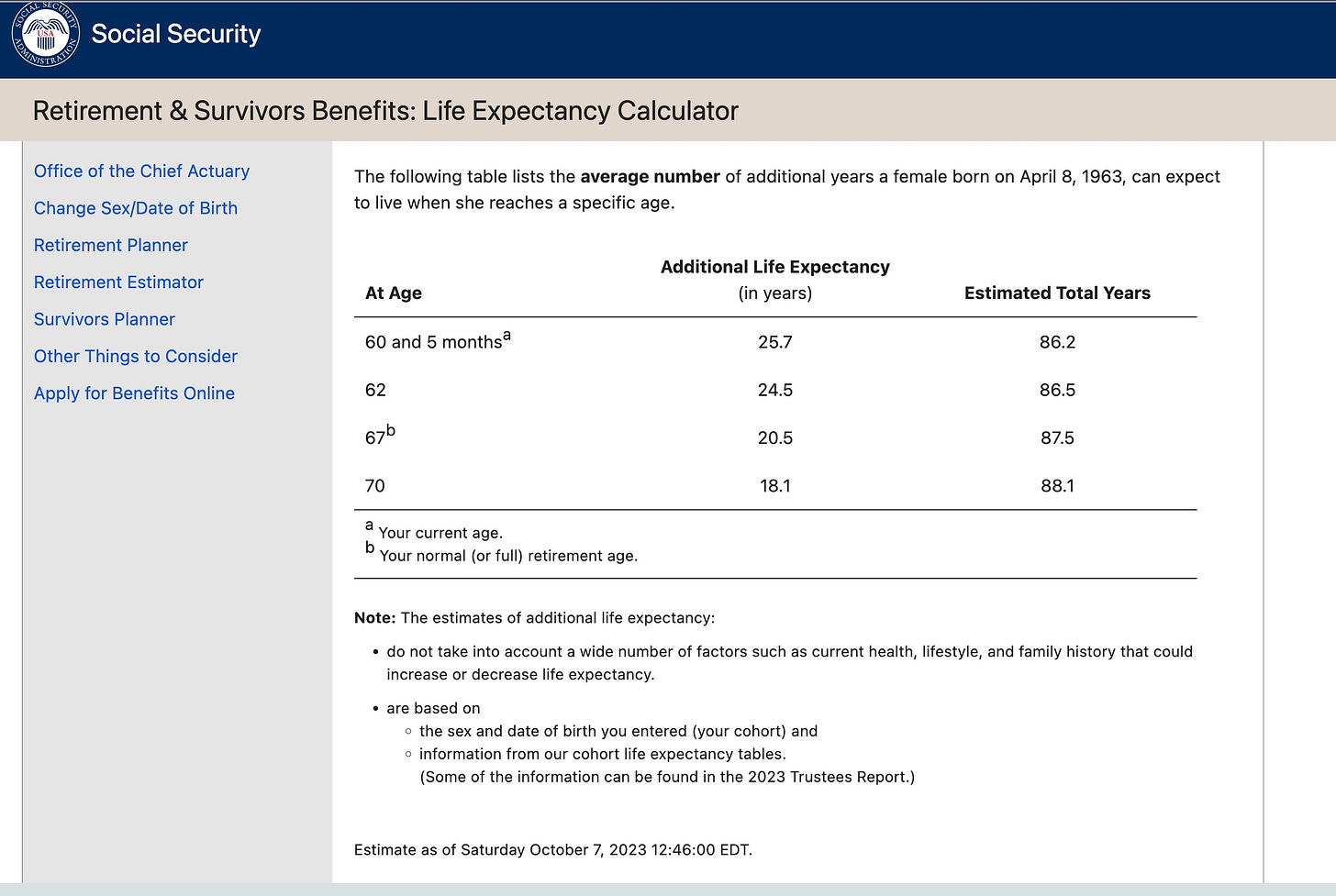The Curious Blessing–and Pleasure– of Not Knowing When You Will Die
Actuarial tables are not for sissies.
Screenshot by author
This week, my husband left a "When to Retire: A Quick and Easy Planning Guide" on my desk chair. He wants me to calculate when it's okay for him to retire. I resist my assignment because the most critical part of the exercise is anybody's guess: how long we will both live.
That is a question neither of us can answer.
I've convinced my kids that I will live to 100, imagining myself a wrinkly bag of bones in a plaid pastel skort playing pickleball with other centenarians. But the Quick and Easy Guide on my desk tells another story. Based on my current age, it provides an actuarial table that predicts that I can expect to live to 83.
83.
As in 23 short years from now. That means I can vote in only six more presidential elections. The census workers will only count me two more times.
I will probably make it to my unborn grandson's high school graduation, but attending his college commencement is iffy. Depending on my granddaughter's life choices, I may live to kiss my great-grandchild.
I queried Google for an actuarial table I could live with.
An actuarial table is a cold, hard, data-driven thing. I am a soft-in-the-middle thing. I searched the internet for more tables, those more generous and yielding with time. Voila! The Social Security Administration actuaries are optimistic people. They are my people.
Their longevity calculator says that given my current age of 60 and 6 months, I can expect to live until 86.2 years old. I am jubilant for an extra three years. The table gives even more good news: If I reach 70, my life expectancy is 88.1 years.
Things are looking up!
Actuarial tables contain statistical averages from government census records and insurance company data often used by businesses to measure financial risk.
Predicted mortality ages change the older you get. With every birthday, life expectancy lengthens because of advances in healthcare, lifestyle, and medical treatments.
My lifestyle choices, genetics, access to healthcare, and overall health may buy me more time, but who knows? An accident, a contagious disease, or any vagary could steamroll my health with the flick of an ash.
The fact is, I don't know when, where or how.
If Google or Chat GPT could foretell some far-out date of death for me, like, just for giggles, October 21, 2050, I'd be okay with it. The date matches a perspective that death is intangible and way out there on the horizon. I can keep on with the status quo.
My laissez-faire attitude may spiral and clot at a drop-dead date of December 28, 2023. With that kind of news, I'd abandon everything and get my affairs in order, after which I'd measure time and pack each minute with meaning.
If I knew it was 3 p.m. today, I'd do nothing but gather my loved ones around.
Our insight depends on how close death feels.
Is there a sweet spot between youth's ignorance and total panic?
Since you and I have the insight but not the exact time, we must inhabit a stable structure under which we'll be okay no matter death’s proximity.
How do we gain this protection? I find comfort in my spiritual practices.
For me, it's yoga, where I can practice my mini-deaths through meditation (read my post about it here) and Corpse Pose (read last week’s post here.)
Most of the time, I feel okay with not knowing when I’ll die because yoga focuses me on what is and what gives me joy.
"If you're not living on the edge, you're taking up too much space." Jim Whittaker, First American to Summit Everest.
The uncertainty of my life span motivates me to maintain meaningful relationships and savor experiences I'm lucky enough to have.
Like traveling
Like celebrations such as my daughter’s Sprinkle this Saturday
Like making memories with my beloveds
Like transplanting butterfly bushes
Like standing at the sink and washing the dishes because the dishwasher broke
Like walking the dog
Like watching gulls barf or feeling the touch of the Maine fog like Bryan Pfeiffer
Like writing this post.
There's joy in even the most mundane because what we spend time doing daily makes up the fabric of who we are. Why not value and hold those things sacred?
Not knowing an end date stokes a belief that there is always a chance for things to improve and that you have the durability to live through it. The hope of a future inspires optimism that a solution is coming.
Surviving 100% of your worst days is an accomplishment and catalyst to stay the course and be grateful that you're still here.
Building our awareness of mortality leads to a greater appreciation for life. There is pleasure in knowing you still get to do things. Acknowledging that tomorrow is not promised adds more depth to the moment.
Whether it’s three o'clock, three weeks, or three decades.
Acknowledging the expansiveness of being here right now is the blessing of being alive.
“As we watch the trees letting go of their leaves without any resistance this season, the birds setting off on their long journeys free from anxiety about the journey ahead and the ants continuing their daily work without any sense of 'I'm working so hard', we can be open to spiritual inspiration from all directions.” Katharine Pincham, Teacher



What makes you feel alive, alive enough not to worry about your death?